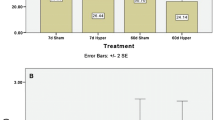Abstract
In order to clarify if hyper-and hypothyroidism change by feed-back mechanisms the dopaminergic controlled release of PRL, TSH and GH, the serum values of these hormones were measured before and following iv administration of 5 mg metoclopramide in 10 hyperthyroid, 11 euthyroid and 10 primary hypothyroid age-matched females, all consecutively investigated. The secretion pattern, as well as the quantitated response (area under the curve AUC) of PRL were identical for the three groups, and uninfluenced by thyroid status. By contrast the TSH responses (AUC) were significantly and positively correlated to the basal TSH, suggesting that the effect of metoclopramide was dependent on the secretory capacity of the thyrotropic cells. The serum GH level was found to decrease in all three groups following metoclopramide, probably due to the inhibition of release. Stimulation of the same subjects with 200 μg TRH iv resulted in response curves of serum PRL and TSH, which were significantly and positively correlated to the basal serum TSH. The serum values of GH increased following TRH in the hypothyroid group, while the values of the hyperthyroid were depressed and unchanged. The present results suggest that the dopaminergic tonus on PRL, TSH and GH secretion is unaffected by thyroid feed-back mechanisms. The TRH-induced release of each of the three hormones is, however, dependent on thyroid status.
Similar content being viewed by others
References
Suter S.N., Kaplan S.L, Aubert M.L., Grumbach M.M. Plasma prolactin and thyrotropin and the responses to thyrotropin-releasing factor in children with primary and hypothalamic hypothyroidism. J. Clin. Endocrinol. Metab. 47: 1015, 1978.
Snyder P.J., Jacobs L.S., Utiger R.D., Daughaday W.H. Thyroid hormone inhibition of the prolactin response to thyrotropin-releasing hormone. J. Clin. Invest. 52: 2324, 1973.
Thorner M.O. Prolactin. In: Besser G.M. (Ed.), The hypothalamus and pituitary. Clin. Endocrinol. Metab. 6: 201, 1977.
Kirkegaard C. The thyrotropin response to thyrotropin-releasing hormone in endogenous depression. Psychoneuroendocrinology 6: 189, 1981.
Eskildsen P.C., Svendsen P.Aa., Vang L., Nerup J. Long-term treatment of acromegaly with bromocriptine. Acta Endocrinol. (Kbh.) 87: 687, 1978.
Frantz A.G. Prolactin. N. Engl. J. Med. 298: 201, 1978.
Semples C.G., Beastall G.H., Teasdale G., Thomson J.A. Hypothyroidism presenting with hyperprolactinemia. Br. Med. J. 286: 1200, 1983.
Malarkey W.B., Bech P. Twenty-four-hour prolactin profiles in normal and disease states. Failure of thyroxine to modify prolactin secretion. J. Clin. Endocrinol. Metab. 40: 708, 1975.
Contreras P., Generini G., Michelsen H., Pumarino M., Campino C. Hyperprolactinemia and galactorrhoea: Spontaneous versus iatrogenic hypothyroidism. J. Clin. Endocrinol. Metab. 53: 1036, 1981.
Delitala G., Deville L., Canessa A., D’Asta F. On the role of dopamine receptors in the central regulation of human TSH. Acta Endocrinol. (Kbh.) 98: 521, 1981.
Feek C.M., Sawers J.S.A., Brown N.S., Seth J., Irvine W.J., Toft A.D. Influence of thyroid status on dopaminergic inhibition of thyrotropin and prolactin secretion: Evidence for an additional feedback mechanism in the control of thyroid hormone secretion. J. Clin. Endocrinol. Metab. 51: 585, 1980.
Sawers J.S.A., Kellett H.A., Brown N.S., Seth J., Toft A.D. Prolactin response to metoclopramide in hypothyroidism. J. Clin. Endocrinol. Metab. 55: 175, 1982.
Scanlon M.F., Pourmand M., Mc Gregor A.M., RodriguezArnao M.D., Hall K., Gomez-Pan A., Hall R. Some current aspects of clinical and experimental neuroendocrinology with particular reference to growth hormone, thyrotropin and prolactin. J. Endocrinol. Invest. 2: 307, 1979.
Collu R., Lebouf G., Letarte J., Ducharme J.-R. Increase in plasma growth hormone levels following thyrotropin-releasing hormone injection in children with primary hypothyroidism. J. Clin. Endocrinol. Metab. 44: 743, 1977.
Hedlund L., Doelger S.G., Tollerton A.J., Lischoko M.M., Johnson H.D. Plasma growth hormone concentration after cerebro-ventricular and jugular injection of thyrotropin-releasing hormone. Proc. Soc. Exp. Biol. Med. 156: 422, 1973.
Author information
Authors and Affiliations
Rights and permissions
About this article
Cite this article
Eskildsen, P.C., Kirkegaard, C.B. The influence of thyroid disorders on the dopaminergic regulation of prolactin, thyrotropin and growth hormone. J Endocrinol Invest 8, 427–431 (1985). https://doi.org/10.1007/BF03348530
Received:
Accepted:
Published:
Issue Date:
DOI: https://doi.org/10.1007/BF03348530




